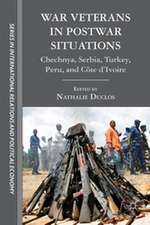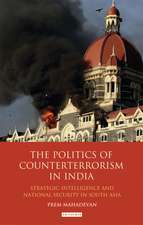9/11 and the Design of Counterterrorism Institutions
Autor Michael Karlssonen Limba Engleză Paperback – 19 oct 2016
| Toate formatele și edițiile | Preț | Express |
|---|---|---|
| Paperback (1) | 469.34 lei 6-8 săpt. | |
| Taylor & Francis – 19 oct 2016 | 469.34 lei 6-8 săpt. | |
| Hardback (1) | 1112.21 lei 6-8 săpt. | |
| Taylor & Francis – 10 iul 2012 | 1112.21 lei 6-8 săpt. |
Preț: 469.34 lei
Nou
Puncte Express: 704
Preț estimativ în valută:
89.81€ • 93.77$ • 74.33£
89.81€ • 93.77$ • 74.33£
Carte tipărită la comandă
Livrare economică 04-18 aprilie
Preluare comenzi: 021 569.72.76
Specificații
ISBN-13: 9781138272439
ISBN-10: 1138272434
Pagini: 208
Dimensiuni: 156 x 234 mm
Greutate: 0.45 kg
Ediția:1
Editura: Taylor & Francis
Colecția Routledge
Locul publicării:Oxford, United Kingdom
ISBN-10: 1138272434
Pagini: 208
Dimensiuni: 156 x 234 mm
Greutate: 0.45 kg
Ediția:1
Editura: Taylor & Francis
Colecția Routledge
Locul publicării:Oxford, United Kingdom
Cuprins
Contents: Introduction; Denmark; Sweden; Finland; Estonia; Latvia; Lithuania; Conclusions; Appendix; Bibliography; Index.
Notă biografică
Michael Karlsson is an Associate Professor of Political Science at Södertörn University, Sweden
Recenzii
'Makes a significant contribution to our knowledge concerning why states respond on terrorism in different ways. This book provides us with important insights on the logic of counterterrorism and is valuable for readers interested in international terrorism and international politics. It should be used by both advanced scholars and graduate students.' Ulf Bjereld, Department of Political Science, Gothenburg, Sweden 'Michael Karlsson provides us with a thorough and interesting study of this problematique, using a theory-guided comparative approach. An institutional design is tested through case studies and the book makes a rewarding contribution to the debate on global terrorism, describing as well as explaining the design of national counterterrorism institutions.' Stefan Höjelid, Linnaeus University, Sweden 'Overall, this book provides valuable insights into the design of post 9/11 counter terrorism institutions... The framework behaviours outlined by the author and their application to specific states following 9/11 are interesting and well written... This book is certainly worth reading by anyone interested in counter terrorism institutional design and the influences that can be exerted by external forces such as NATO.' Journal of Policing, Intelligence and Counter Terrorism
Descriere
Karlsson argues that 9/11 led to a considerable pressure to strengthen rules and practices for counterterrorism and security, but that this pressure was mediated by several other conditions. The reforms were also affected by, among other things, how the threat of global terrorism was perceived, pressure from international institutions such as the UN, EU, and NATO, the domestic political context, and pre-existing rules and practices. The book offers a unique lens on the study of counterterrorism from a new theoretical and regional perspective.















